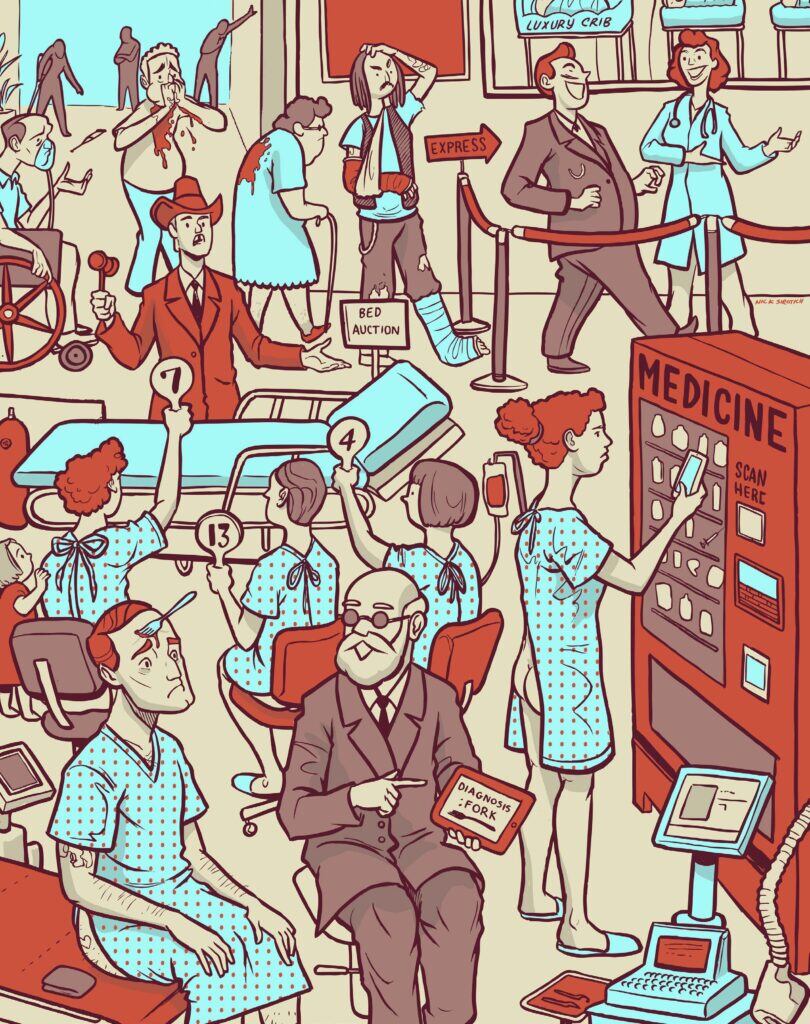
Silicon Valley Won’t Save You
The tech industry should not be allowed near policymaking...
Back in March 2016, around the time that it became clear that Donald Trump was going to be the Republican nominee for president, the New York Times asked a fairly simple question of the Silicon Valley-backed startup Juicero: what is it?
No one could really say. Founder Doug Evans, who compared himself to Steve Jobs, had raised $118 million in funding from Silicon Valley venture capital firms such as Google Ventures and Artis Ventures (and even the Campbell Soup Company). “It’s the most complicated business that I’ve ever funded,” one Google Ventures partner said. “It’s software. It’s consumer electronics. It’s produce and packaging.”
The concept of the Juicero turned out to be this: you buy a $699 (later knocked down to $400) Wi-Fi connected juicer called the Juicero Press—which Evans said could create three to four tons of pressure, enough “to lift two Teslas.” Then you subscribe to a delivery service for the juice itself, which comes in little pouches. (Only owners of the Press can buy the pouches, which were to cost around $5 to $8 each.) Lock the pouches into the Press, hit a button, and the juice is squeezed out. It was marketed as the Keurig for juice.
Yet the Juicero had a hilarious design flaw. Reporters from Bloomberg News discovered that there was a far more efficient way, using a somewhat older form of technology, to squeeze the juice out of the bags than by using the $400 press: with a pair of human hands. Squeeze the bag, the juice goes into the glass, no Juicero needed. The whole elaborate apparatus was an utterly useless hi-tech substitute for something that people could already do.
In that sense, the Juicero was a perfect encapsulation of the tech industry as a whole. Stuff nobody needs, at prices nobody should pay, invented by “visionaries” who think they’re Steve Jobs and pretend to be revolutionizing an industry while actually just finding new ways of robbing and tricking people.
Yet perhaps we could laugh a bit more at the Juicero if the worldview that made it was inconsequential. Lately, however, Silicon Valley has begun threatening to export its values to our political system. Leaders of the industry like Facebook’s Mark Zuckerberg and Mark Cuban are now publicly entertaining the idea of running for president, Google is introducing its products into schools around the world, and billionaires like Jeff Bezos and Bill Gates are plotting their own unaccountable social experiments under the banner of philanthropy. As David Callahan writes in the New York Times, while government programs stagnate or diminish under Republican rule, ultra-rich donors “will increasingly slide into the driver’s seat of public life,” appropriating government functions but without any actual accountability.
The increasing power of Silicon Valley tech billionaires means the increasing influence of a political philosophy that would be catastrophic for ordinary people, giving them less and less control over their workplaces, schools, and government, while funneling wealth upward to further enrich a tiny minority of people at the top. But, like the Juicero, proposals that would only serve to bilk people of their money for nothing in return will come disguised beneath a thick layer of vacuous, dishonest hype.

To see why Silicon Valley policy-making would be so insidious, we should look at a plan that seems, on the surface, like one of its most progressive ideas: the tech community’s recent embrace of the “Universal Basic Income” (UBI). The idea of a UBI is that all people should be guaranteed a baseline income from the government, which would ensure that they can subsist and that nobody would be in dire poverty. It would be a truly universal guarantee, in that there would be no requirements for receiving it. The idea has long been a favorite of the left, since it would ensure the downward redistribution of wealth, based on criteria of need rather than “merit.”
But even though the UBI has often seemed like a utopian leftist pipe dream, in recent years it has picked up support in an unexpected place: Silicon Valley. A number of tech entrepreneurs have begun to publicly endorse it. Mark Zuckerberg has publicly signed on. And Y Combinator, the most prestigious and obnoxious of the Silicon Valley startup incubators, announced it would launch a local universal basic-income pilot program, giving monthly disbursements of $1,000 to $2,000 to 100 families throughout Oakland and seeing what happens after six months or a year.
That Silicon Valley—home of the callous libertarian billionaire—has come to embrace what’s traditionally viewed as a principle of leftist origin may seem contradictory. Why would a hotbed of private enterprise suddenly latch onto something that sounds an awful lot like socialism?
The answer lies in the concept’s malleability; there are many kinds of “UBI,” and the socialist UBI and the Silicon Valley UBI are not one and the same. One of them is an attempt to create a world of equality and prosperity for all. The other is an attempt to offer bare subsistence as a replacement for government programs, while leaving a fundamentally unequal economic and power structure fully in place.
Silicon Valley’s interest in basic income actually isn’t new. For years, concern over the effect of artificial intelligence and robotics on employment has led tech magnates to contemplate similar proposals. Dot-com bubble multimillionaire Marshall Brain envisioned a corporate-friendly UBI framework in his 2003 online novella Manna. In the story, an American man is ousted from his newly automated fast-food job; he soon finds refuge in a basic-income scheme in which robots are responsible for labor and manufacturing. Said scheme is the product of private enterprise: the benefactor is a startup founder in the Australian outback, and the man’s ticket to prosperity is actually in the stock his father bought in the company years prior.
In a TED Talk from February of 2013, Andrew McAfee, co-director of the MIT Initiative on Digital Economy, argued that the escalating sophistication of automation had ushered in “the new machine age”: an era of prosperity and abundance, but also one in which “technological unemployment is at hand.” A basic income, he suggested, would help to financially stabilize those affected. The theory is “associated with the extreme Left wing,” McAfee conceded in front of a tripartite projection of Marx, Lenin, and Castro. Nevertheless, McAfee offered his audience a neoliberal salve: the UBI had also been espoused by “those frothing-at-the-mouth socialists Friedrich Hayek, Richard Nixon, and Milton Friedman.”
Certainly, technologists understand that the software they develop is steadily rendering low-wage human workers obsolescent; robots are already visibly supplanting grocery clerks, fast-food workers, customer-service agents, and soon enough, professional drivers. With a monthly allotment of funds, however, those economically marginalized by Silicon Valley can regain lost income, the logic goes. Plus, if people who’ve lost their jobs to software receive compensation, the industry won’t seem quite so guilty of robbing them of their livelihood at breakneck speed. At once, universal basic income permits the advancement, proliferation, and profit potential of automation while absolving the industry of its culpability for stripping people of their jobs.

Much of the appeal of a UBI to Silicon Valley is that it is “anti-bureaucratic” and “streamlined,” and it should be no surprise to find out that UBI proponents in tech intend to fund it by gutting the public sector. Chris Hawkins, an investor who made his money building software to automate work, told Vice in 2015 that he wanted to “shut down government programs as you fund redistribution.” “The cost has to come from somewhere, and I think the most logical place to take it from is government-provided services,” he added. On his venture-capital firm’s website, Hawkins has plumbed federal-spending data, hypothesizing that “because our current social spending programs cost 11.4%, and Basic Income would be expected to cost 7.7%, we expect to save 3.7% of GDP by switching to Basic Income.” (That is, the federal government could spend 3.7 percent less annually on the poor.)
Netscape creator and venture capitalist Marc Andreessen, who deems the notion of basic income “a very interesting idea,” sympathizes with Hawkins’ proposition. In 2014, he told New York magazine, “We have very high tax rates. We generate enormous amounts of tax revenue, and we have a very big safety net. There are 15 national nutrition-assistance programs in the U.S. right now. Not one. Fifteen.” In the same interview, Andreessen spoke glowingly of the libertarian bent on UBI and its intent to “forget having that giant government machine,” i.e. the UBI would supplant public housing, food stamps, and Medicare. Bell Curve author Charles Murray has issued UBI proposals on similar lines: get rid of all social programs, and give people a check instead.
That check may well fall short of the value conferred by those social programs, and it’s unlikely to give people much of a life beyond bare subsistence. $12,000, the annual amount offered in the Y Combinator program, is a hair below the federal poverty level for an individual (which, as of 2017, is $12,060). Most people would therefore need to seek some other kind of supplemental employment, even as the work available continue to dry up thanks to automation. According to the Center for Global Policy Solutions, 93 percent of professional drivers lack a college degree; as they lose their jobs, they may need to turn to other low-wage work, which they’ll eventually lose to software. In fact, workers may not even see much of the benefit of their UBI check: if their new gains are simply passed on to landlords and merchants through higher rent and prices, the benefits will be entirely illusory, even as people appear to be receiving an enormous handout. (Plus, if history has told us anything, it’s that private employers like Uber and Walmart will jump at any opportunity to further exploit workers. The very existence of a UBI could be used as a pass to slash wages.)
A UBI remains a desirable prospect, if it is introduced in pursuit of the right objectives. But if any sort of basic income is to be instituted, it cannot be at the expense of other forms of governmental assistance; that would just perpetuate or worsen the status quo. Under current proposals, the UBI wouldn’t even cover a year’s healthcare and housing costs. Any UBI proposal must supplement improved versions of existing social services, including a robust single-payer healthcare system. Furthermore, we might consider a “progressive basic income” (PBI) instead, which does not pay all people the same amount, but pays them in proportion to their financial need, with the poorest receiving the most.
As proposed Silicon Valley’s futurocapitalists, basic income isn’t an exercise in expanding our freedom to pursue fulfillment; it’s a way to perpetuate exploitative work. Silicon Valley’s first priority is simple: to accumulate capital. In proposing a UBI, the tech industry has simply found another way to convince people it is “changing the world” and doing good, without proposing anything that would threaten the wealth and power of Silicon Valley itself. This is why the tech industry’s influence needs to be halted; none of its proposals for making the world better will come at the industry’s own expense, meaning that none of it will address the economic problems exacerbated by the industry. A Silicon Valley economy is one with razed social protections, constant anxiety over the potential loss of your job, and a gaping divide between rich and poor.
One shouldn’t underestimate the social harm done by tech capitalism. It’s a key contributor to the precariousness faced by workers across the economy. Ride- and home-sharing services like Uber and Airbnb employ and exploit “contractors” who, in a better economic environment for the working class, might not have chosen to open up their personal spaces to complete strangers. Companies like Facebook and Google own users’ data and can still sell it to advertisers, sometimes continuing to do so even after the user shuts down their account. It’s an industry that runs roughshod over municipal governments, avoids paying taxes, and is hostile to any attempt at unionizing its workplaces.
Tech’s attempts to undermine the labor movement have been present for decades. “Remaining non-union is an essential for survival for most of our companies,” Intel co-founder Robert Noyce said way back in 1963. “If we had the work rules that unionized companies have, we’d all go out of business.” Fifty-four years later, the tech giants have heeded his advice; in one of the few actual concerted efforts in the industry to organize, IBM held off unionization for seventeen years before Alliance@IBM and the Communications Workers of America “suspended” their organizing efforts in January 2016.

No wonder, then, that the tech industry has donated significant amounts to Republicans who promise to keep pushing anti-worker and pro-boardroom policies. A 2016 analysis by the Institute for Southern Studies found that businesses whose CEOs and heads had signed a letter denouncing North Carolina’s discriminatory “bathroom bill”— Facebook, Google, Yahoo, and eBay, to name a few — dumped an enormous amount of money into the Republican Governors Association and Republican State Leadership Committee, two federal PACs tasked with getting Republicans elected at the state and local level.
There’s an obvious need for tech workers—and, it goes without saying, the rest of the working class—to build power. That’s true even among higher-paid engineers and developers, who are ruthlessly overworked with little input into how their companies are run. There are some glimmers of hope on this front (in 2015, the Seattle City Council unanimously passed a law allowing Lyft and Uber drivers to unionize, though Uber has sued), but we know for sure that the only way to improve the labor movement’s prospects is by fighting Silicon Valley rather than empowering it.
And lately, it seems that formal political power is just what Silicon Valley might be seeking next. Mark Zuckerberg has begun to display all the signs that he is running for president. In December, Zuckerberg—a longtime atheist—suddenly declared that “religion is very important.” Zuckerberg also embarked on a fifty-state tour to meet “Facebook users”—i.e., voters—all across the country. Along with Zuckerberg, speculation has surrounded the political ambitions of Mark Cuban, the Dallas Mavericks owner and billionaire. When Business Insider asked Cuban in February if he was running for president in 2020, Cuban responded with an ominous “we will see.” A month later, he told the Washington Post: “Sometimes you got to do what you got to do.”
It’s not hard to see why people like Zuckerberg and Cuban think they can run the country; a much dumber billionaire is already doing so. And if they run on a Bloomberg-style “I’m above left-right politics” pitch, people may even be tempted to think they’d do a good job.
But this would be a mistake. Americans must end their love affair with captains of industry who promise to “run the country like a business.” (Or, like France’s Emanuel Macron promised, to run a country “like a start-up.”) “Business experience” does not make for competence, as Donald Trump and the Juicero reveal to us equally well. And running a government like a business means sacrificing people’s well-being for the enrichment of the few who run the show. This is, after all, what business does, and no amount of upbeat Bay Area jargon about innovation should ever disguise that. A Juicero presidency will disrupt nothing except public schools and civil rights laws, and only serves to more directly represent the interests of the most moneyed and powerful. As the dishonest Silicon Valley pitch for a UBI shows, the tech industry can’t be entrusted with workers’ well-being.
Instead, what we need is a real adjustment of power: to build a political force of blue and white collar workers that stands up in the face of injustice and demands real democratic control of institutions and substantive equality, not just scraps to subsist on as our way of life crumbles. We need the power to make sure everyone lands as safely as the wealthy and powerful do when they fail (say, by vomiting money into a useless $400 juicer). Silicon Valley’s snake oil will not save us. The only way to truly disrupt power is by destroying the fancy juicer and squeezing the bag ourselves.

This article appears in our “Silicon Valley Spectacular” print issue. To get your copy, subscribe today or purchase in our online shop.




